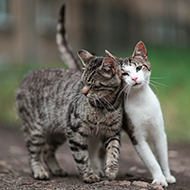The charity believes the rising cost of living causes many cases.
The Scottish SPCA has warned that the country is facing an animal welfare crisis, as it sees an increase in rescue cases.
The charity has reported a 25 per cent increase in animal rescues in 2023, with almost three-quarters of these animals requiring urgent veterinary treatment.
However, although many cases are the result of intentional abuse, there are increasingly more cases of unintentional harm, where owners have been unable to afford veterinary treatment. In 2023, 43 per cent of people who contacted the Scottish SPCA’s helpline called to discuss giving up their pet for financial reasons.
It saw a 10 per cent increase in calls to its helpline, recording more than a quarter of a million calls in 2023.
One case related to Scotland’s cost-of-living crisis was six-year-old dog Bentley, who was brought into Aberdeen Rescue and Rehoming Centre. Despite being well-loved, Bentley was given to the charity when his owners were unable to afford treatment for his skin problems and allergies.
Bentley has since been found a loving home with a new family.
In an attempt to counter the difficulties of the cost-of-living crisis, the charity launched a new service called Pet Aid. Pet Aid now works 71 food banks across Scotland to provide pet food and essentials for pet owners who are struggling to make ends meet, and otherwise face sacrificing their pet.
Since its launch, PetAid has helped more than 400 people each month. Community veterinary nurses have also supported pet owners with basic healthcare assessments.
However the cost-of-living crisis has also had an impact on the charity, which has seen a rise in the cost of delivering its services – as energy bills, food costs and veterinary fees all increase. The charity is calling for support so that it can continue to provide its vital services.
Kirsteen Campbell, chief executive of Scottish SPCA, said: “It’s clear from our latest annual figures that animals across Scotland have never needed us more.
“It is heart-breaking to see so many animals come to us because their owners simply can no longer cope or make ends meet. The animal welfare crisis and cost of living crisis go hand in hand and it’s also costing us more than ever as a charity to do what we do.”
Donations can be made on the Scottish SPCA website.
Image © Scottish SPCA



 International Cat Care (ICatCare) has announced a free, virtual event dedicated to caring for unowned cats to explore new ideas and ways of working.
International Cat Care (ICatCare) has announced a free, virtual event dedicated to caring for unowned cats to explore new ideas and ways of working.